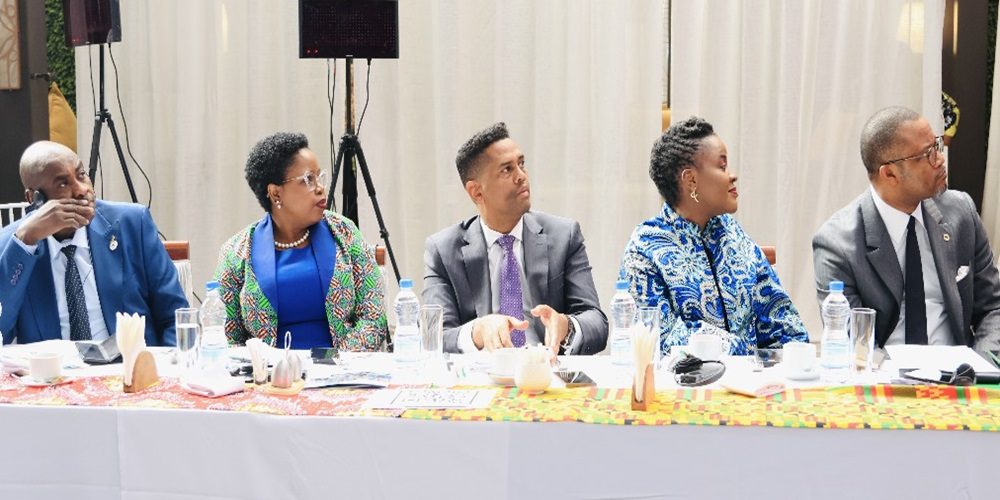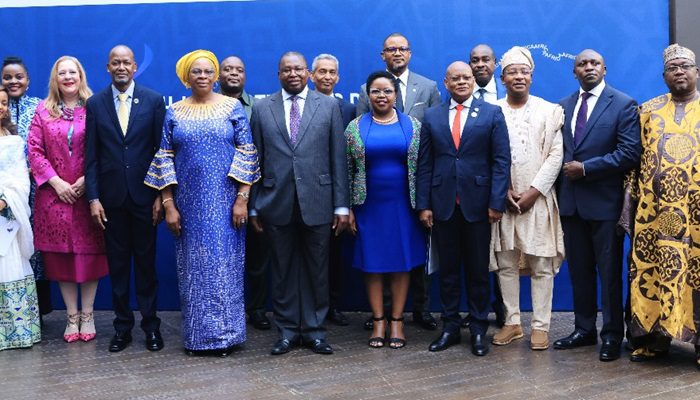In a landmark call for continental unity, several high-profile speakers at the ongoing Africa Integration Summit underscored the importance of visa-free movement in driving economic growth and social cohesion across Africa.
At the heart of the debate was the notion that the seamless movement of people is the backbone of integration and economic prosperity.
Mrs. Nnenna Nwabufo, Vice-President of the Regional Development and Visionary Programs (RDVP), passionately declared that “seamless movement of people is the backbone of integration and economic prosperity.”
She emphasized that a continent without barriers is one where trade flourishes, opportunities abound, and collective growth is not hindered by outdated visa restrictions.

Ghana leading by example
Mrs. Nwabufo pointed to the 2024 Africa Visa Openness Index Report, noting that 39 African countries have improved their visa openness scores since 2016.
“For example, Benin, Gambia, Rwanda, and Seychelles have set bold examples by eliminating visa requirements entirely for fellow African travelers,” she stated.
Emphasizing the need for technology in enhancing travel ease, she highlighted that the number of African Union Member States offering e-visas has jumped from just nine in 2016 to 26 in 2024.
However, she lamented that despite these gains, Africans still face visa requirements for at least 70% of their travel within the continent—a hurdle that stands in stark contrast to the ambitious goals of the African Continental Free Trade Area (AfCFTA).
The Promise of a Single African Market
Mrs. Nwabufo painted a vivid picture of success: envisioning an Africa where a young engineer from Lagos can board a short flight to Nairobi for a project with nothing more than his passport, or where a tourist from Mali can spontaneously visit Egypt’s pyramids or Cape Town’s vineyards on a single African passport.
“We want an Africa where businesses expand seamlessly across borders, and students from all corners of the continent mix freely in our universities.
“We want an Africa where no African is a foreigner anywhere in Africa,” she asserted, calling for a re-examination of existing travel policies to unlock the full potential of the AfCFTA.
Economic realities and growth potential
Commissioner for Economic Development, Trade, Tourism, Industry and Minerals of AfCFTA Albert Muchanga contributed an economic perspective to the discussion, noting that intra-African tourism currently accounts for only 45-48% of total tourist arrivals—a figure that pales in comparison to regions such as China and Europe.
Citing figures from AfDB, Muchanga highlighted that Africans spend over $1 billion annually on medical services abroad, a stark indicator of the need for stronger intra-African cooperation.
He stressed that a common market would not only harmonize policies and ease the circulation of goods and people but could potentially elevate Africa’s per capita Gross Domestic Product (GDP) to $65,000 by 2063, with an aggregate GDP of $160 trillion.
Muchanga warned that without accelerated progress towards a unified market, the continent could face significant trade deflections due to third-party agreements.
Ethiopia’s pioneering role in continental integration
Adding an international perspective, Dr. Kasahun Gofe, Minister of Trade and Regional Integration of Ethiopia, hailed Ethiopia as a beacon of freedom and resilience for Africans.
Dr. Gofe highlighted Ethiopia’s recent economic reforms and robust homegrown policies that have opened its market to all Africans.
He praised Ethiopian Airlines for its role as a pan-African connector, uniting diverse nations and cultures under a single banner of economic opportunity.
Harnessing digital transformation for integration
Dr. Joy Kategekwa, Director of the Regional Integration Coordination Office at the AfDB Group, spoke with palpable enthusiasm about the continent’s digital transformation.
“We have witnessed incredible and overwhelming support for a visa-free Africa,” she said.
Dr. Kategekwa stressed that both the AfDB and the African Union Commission are committed to maintaining this momentum throughout the year.
Digitalization, she noted, is key to streamlining immigration services, reducing lengthy visa processing times, and ultimately, facilitating the free movement of people and goods across Africa.

Driving policy and migration reforms
Rounding out the discussion, Dr. Sabelo Mbokazi, Head of the Employment, Labour and Migration Division at the AU Commission, urged continental stakeholders to leverage key platforms such as the Pan African Forum on Migration and ministerial meetings.
“We must shine a light on those making progress and highlight the need to do more,” he emphasized.
Dr. Mbokazi reiterated that only through concerted efforts can Africa push ahead towards achieving a visa-free continent, thereby bolstering economic integration and development.
A vision for the future
The speakers collectively called for a paradigm shift in how African nations approach migration and trade.
They stressed that by removing barriers to movement—both for individuals and businesses—Africa could unlock unprecedented economic opportunities and foster a more inclusive society.
The summit not only celebrated the achievements in visa openness and digital integration but also served as a rallying cry for continued reforms that will pave the way for a truly united African market.
In an era where integration and technology are key drivers of progress, the collective voice from the summit sends a clear message: the future of Africa lies in the free movement of its people, the seamless exchange of ideas, and the removal of barriers that hinder growth and unity.
- Tuesday, May 6, 2025 Newspaper Headlines - 6 May 2025
- Mahama unveils Code of Ethics for appointees - 5 May 2025
- No system breach, MoMo is safe, secure- MTN - 5 May 2025




